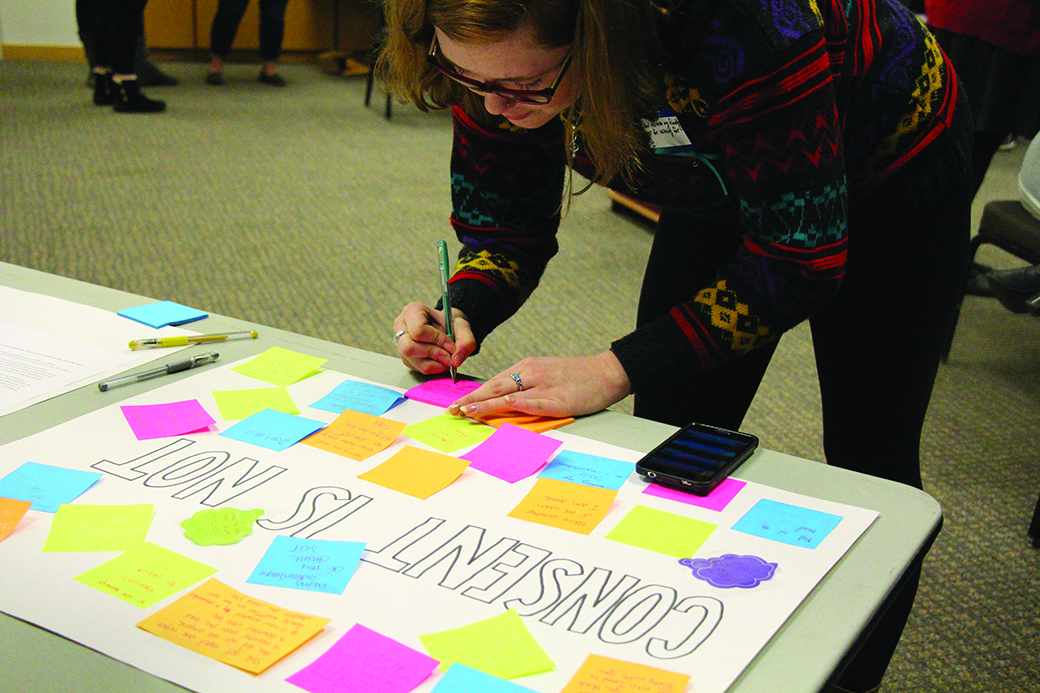
Victimology class reflects on sexual assault awareness event
Sexual assault victims shared their stories at an event called Take Back the Night this past Thursday.
Take Back the Night was a student-run awareness event held by students in Victimology – a criminal justice class that studies issues surrounding victims of sexual assault, among other things.
“Take Back the Night is a movement that is nationwide that raises awareness about sexual assault and really show how many victims there actually are,” Cassy Jerrett, a victimology student, said. “Sexual assault is such an underreported crime. There are some statistics that say that college women are as likely to be raped as one in four or even one in three. It’s a pretty serious statistic that we are trying to eradicate by raising awareness about it.”
Victimology is the study of victims, assistant professor Bridget Diamond-Welch said. It’s a field that’s only been around for the last couple of decades, she added.
“The first part of the semester focuses on victims of interpersonal violence, which is person-on-person crime,” she said. “The second half of the course focuses on different ways of understanding a victim. This more shows victims of something that is not against the law, such as racial inequality, poverty, drone attacks, etc. This explores the idea of what is harm and who is a victim.”
The Take Back the Night event was put on as a requirement for the class, Diamond-Welch said.
“I believe very strongly that education doesn’t stop in the classroom,” she said. “In most of my classes, students are required to do further educationals. In this class what I wanted them to do, because victimology is so new, I wanted them to put on an educational (event) for the university.”
Before the event on Oct. 29 began, participants created name tags to wear with different stereotypes of sexual assault, made a poster with funny ways to ask for consent and put sticky notes on a poster with their definition of consent.
When featured speaker Sheila Thomas, who is a sexual assault nurse examiner, finished her speech, audience members had the opportunity to talk about their own experiences.
Five people shared their stories of being raped or sexually assaulted.
Despite it being required for a grade, Jerrett said everyone was willing and excited to get the event started.
“Take Back the Night got started because our professor is a rape crisis counselor and she talked about creating an event, which is a part of our grade,” Jerrett said. “But once we all found out what Take Back the Night would look like, we all were then willing to chip in, have a good time and provide for the event.”
Diamond-Welch said students gained a lot from the experience.
“It makes students collaborate,” Diamond-Welch said. “You have to work together and figure out the process of what an institution has to go through to do something. It’s also a chance to create and craft a vision together and see that vision come to life. I believe they all felt very proud after. I think it’s a different kind of learning experience. It’s a chance to actually put something out into the world and make a difference.”
For now, this will be the only Take Back the Night event, but Jerrett said she’s hoping for it to become a more common occurrence.
“I would like to for this to take off as even a student group,” she said. “It’s very important, especially on a campus that has only had four reported rapes in five years.”
Diamond-Welch felt the event was a success.
“I think Take Back the Night was a great success,” she said. “We had 50 people not including the class come. We had survivors talk. I talked to a survivor afterwards that said she felt better after sharing her story. If nothing else, that’s direct change in that person’s life. I am very proud of the students that put it on.”

